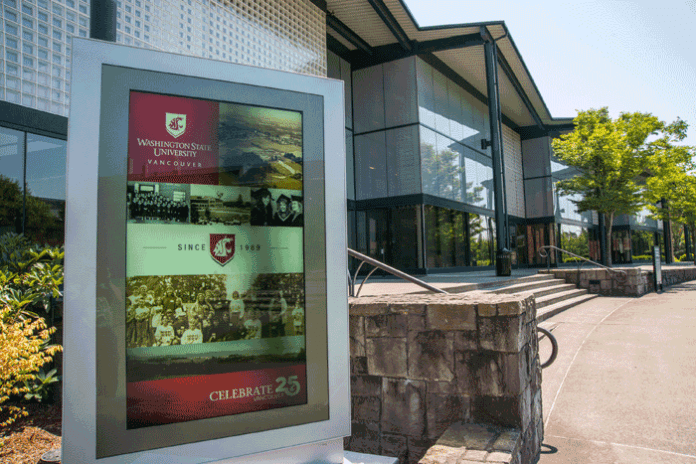25 years ago, Washington State University opened its Vancouver branch on the Clark College campus. From the very beginning, the university has been closely tied to Clark County’s business community, and those partnerships have grown even stronger over the last quarter-century.
WSU-Vancouver Chancellor Emile “Mel” Netzhammer joined the campus in July 2012, and has glowing praise for the relationships between the university and the community.
“The variety and richness of the partnerships between WSU Vancouver and our business community are as strong as at any university I’ve seen,” he said. “Stronger than most. Our business and community leaders worked hard to get our campus established here, and so we’ve been integrated into our community since the very beginning. We have over 11,000 graduates who continue to work and live in our region.”
Elson Strahan, president and CEO of the Fort Vancouver National Trust, has seen the full development of the university from its first days through the present. As a 1999 graduate with a master’s degree in public administration, he has also experienced being a student at the campus.
“The desire for upper division and graduate level higher education resources in Southwest Washington had been clear for many years,” said Strahan. “Having Washington State University establish a branch campus in Vancouver was the culmination of ongoing advocacy from the community, including strong support from the business community. The positive impact of WSU Vancouver has been incredible, and is a result of the university’s responsiveness to meeting community needs as well as their effective partnering with so many organizations. While some may be surprised at WSU-V’s rapid and successful trajectory, I am not. The university has simply done an extraordinary job of reading the pulse of the community and addressing our higher education needs.”
And the impact goes both ways, Netzhammer said.
“The impact of the business community on WSU Vancouver cannot be overstated,” he said. “Local support comes in so many ways. The philanthropic support from the business community provides support for buildings, faculty, research and equipment. Local business creates opportunity for residents of Southwest Washington to get their baccalaureate and graduate degrees through dozens of scholarships. Business leaders serve as mentors to our students and collaborate with our faculty.”
Mike Bomar, executive director of the Columbia River Economic Development Council, received his master’s degree in public administration from WSU Vancouver in 2005. From his perspective as both an alum and a professional working closely with businesses in Clark County, the mutual impact has been impressive.
“The business connection has always been there,” he said. “It was less formal and obvious when I was a student there, but now the partnerships have become more prevalent and areas like engineering and healthcare are taking off. It’s a strong partnership culture that has only grown with Mel’s presence as chancellor.”
“We have been very thoughtful in our academic evolution,” added Netzhammer. “The programs we offer have developed because of community and business needs. We have added programs in hospitality business management or electrical engineering, for example, with incredible support from the business community.”
Jane Cote, academic director for the university’s Carson College of Business, reiterated that point.
“Everyone has ideas for great new programs,” she said, “but we can’t do everything. Bringing on a new program requires a great deal of study: Does it fit with our mission? Is it a real need for this community? Do students want it? And are there employment opportunities for students at the other end? All of those things went into the decisions on both our new entrepreneurship program and the hospitality business program. We had been assessing hospitality for 15 years. It got to where it really looked good, then the recession hit and set everyone back. Now we are all starting to recover, and it’s growing. This region really does need individuals who have that skill and training.”
Under the Carson College of Business, Mistie Josephson manages the Business Growth Mentor & Analysis Program (MAP). The MAP program creates a student consultancy which pairs groups of students with small businesses in the region. The students offer their expertise to help participating businesses grow, and the businesses give students direct, real-world experience. Volunteer mentors from the business community also work with each of the student teams, helping guide their work and increase their productive results.
One of the most unexpected but gratifying results of the MAP program is the ongoing relationships that have developed. In many cases, the relationships aren’t ending at the end of the semester – they are just getting started.
“The business community here is fantastic,” Josephson said. “It’s exciting to see so many mentors stay in touch with the students” as well as seeing opportunities develop for graduates because businesses were able to grow through the help of the student team.
Moving forward, Netzhammer said, the university plans to continue to build on successes.
“WSU Vancouver is and wants to be a part of the economic health of our region,” he said. “Over the next 25 years, we will continue to nurture the relationship between WSU Vancouver and the business community. We will continue to evolve as the needs of our community evolve. The legislation that created us calls on us to be responsive to our local business community’s needs. We embrace that wholeheartedly – not just because we’re required to, but because we know it serves our students and Southwest Washington to actively engage with our business community.”



